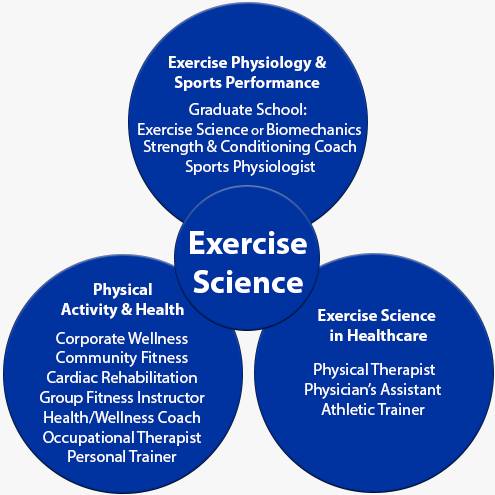Curriculum: Exercise Science, B.S.
As of the Fall semester 2023, the Exercise Science program will be phasing in our curriculum for incoming students (see below). This includes a few changes to the core curriculum, and three emphasis areas. If you are an existing EXS student (i.e., you have a catalog year prior to Fall 2023), this will not affect your progress or time to graduation. You will complete your degree/University requirements as shown on your MyPath. We acknowledge that some of you may be interested in aspects of the new curriculum; however, opting to change your catalog year and declare one of the new EXS emphasis areas may delay your time to graduation.
Core courses
The new Exercise Science major curriculum is aligned for CoAES Accreditation. Within this major ALL students will take the same CORE courses, then choose ONE of the following emphasis areas (see below) to complete the remaining courses required within the major.
- EXS 195: Introduction to Exercise Science
- EXS 209: Research Methods in Exercise Science
- EXS 220: Exercise Instruction and Leadership
- EXS 320: Exercise Testing and Prescription
- EXS 321: Exercise Testing Lab
- EXS 470: Exercise for Special Populations
- EXS 490: Internship in Exercise Science
- EXS 495: Professionalism, Exercise Science
- BIO 120: General Biology
- BMS 105: Basic Nutrition
- BMS 250: Anatomy and Physiology I
- BMS 251: Anatomy and Physiology II
- CHM 109: Introductory Chemistry
- ATH 217: Modern Principles of Ath.Training
- MOV 300: Kinesiology
- PSY 101: Introductory Psychology
- STA 215: Introductory Applied Statistics
Choose your EMPHASIS
We have three emphasis areas available, and you must choose the ONE that aligns best with your career aspirations.
Exercise Physiology & Sports Performance
This emphasis focus deepens and expands content in human athletic performance and the physiology of training, thus preparing students for careers in strength & conditioning, sports science, biomechanics, and graduate school/academia.
4 yr Curriculum Guide (Exercise Physiology & Sports Performance)
The following courses must be completed to fulfill the Exercise Physiology & Sports Performance emphasis requirements:
- EXS 355 - Essentials of Sport Science (3cr)
- EXS 360 - Strength & Conditioning for Athletic Performance (3cr)
- EXS 400 - Biomechanics (3cr)
- EXS 404 - Advanced Exercise Physiology (3cr)
- EXS 440 - Environmental Exercise Physiology (3cr)
Elective credits - Students must complete eleven credits from the following:
- BMS 305 - Clinical Nutrition (3cr)
- EXS 200- Psychosocial Aspects of Exercise and Physical Activity (3cr)
- EXS 330 - Physical Activity and Public Health (3cr)
- EXS 390 - Fieldwork (2cr)
- MOV 310 - Motor Skill Development (3cr)
- PH 222 - Public Health Concepts (3cr)
- PHY 216 - Physics of Sport (3cr)
- STA 345 - Statistics in Sports (3cr)
Physical Activity & Health
This emphasis deepens content knowledge in health, wellness, and public health, thus preparing students for careers in occupational therapy, community wellness, corporate/employee wellness, cardiac rehabilitation, personal training, and graduate school/academia.
4 yr Curriculum Guide (Physical Activity & Health)
The following courses must be completed to fulfill the Physical Activity & Health emphasis requirements:
- EXS 200 - Psychosocial Aspects of Physical Activity and Exercise (3cr)
- EXS 330 - Physical Activity and Public Health (3cr)
- EXS 370 - Exercise Across the Lifespan (3cr)
- EXS 465 - Cardiopulmonary Rehabilitation for the Clinical Exercise Physiologist
- MOV 310 - Motor Skill Development (3cr)
- PH 222 - Public Health Concepts (3cr)
Elective credits - Students must complete eight credits from the following:
- EXS 360 - Strength & Conditioning for Athletic Performance (3cr)
- EXS 390 - Fieldwork (2cr)
- EXS 404 - Advanced Exercise Physiology (3cr)
- PSY 310 - Behavior Modification (3cr)
- PSY 364 - Life Span Developmental Psychology (3cr)
- PSY 367 - Health Psychology (3cr)
Exercise Science in Healthcare
This emphasis provides a logical gateway for graduate health professions-seeking students (athletic training, physical therapy, and physician assistant) by broadening their basic biological and physical science background. This emphasis is intentionally diverse in electives to accommodate the wide range of graduate health profession pre-requisite coursework not already offered within the Exercise Science core curriculum.
4 yr Curriculum Guide (Exercise Science in Health Care)
The following courses must be completed to fulfill the Exercise Science in Health Care emphasis requirements:
- BIO 328 - Biomedical Ethics (3cr)
- BMS 223 - Infectious Human Diseases (3cr)
- CHM 230 - Introduction to Organic and Biochemistry (4cr) OR CHM 231 + CHM 232 (8cr)
- PHY 200 - Physics for Life Sciences (4cr) OR PHY 220 + PHY 221 (10cr)
Elective credits - Students must complete twelve credits from the following:
- ATH 210 - Directed Observation in AT (1cr)
- ATH 218 - Modern Principles of Athletic Training Lab (1cr)
- BIO 355 - Human Genetics (3cr)
- BMS 212 - Introduction to Microbiology (3cr)
- BMS 213 - Laboratory in Microbiology (1cr)
- BMS 305 - Clinical Nutrition (3cr)
- BMS 355 - Anatomy of Joints (2cr)
- BMS 427 - Neuroanatomy (1cr)
- CHM 231 - Introductory Organic Chemistry (4cr)
- CHM 232 - Biological Chemistry (4cr)
- EXS 360 - Strength and Conditioning for Athletic Performance (3cr)
- EXS 400 - Biomechanics (3cr)
- EXS 440 - Environmental Exercise Physiology (3cr)
- MOV 102 - First Aid, CPR, and AED (2cr)
- MOV 310 - Motor Skill Development (3cr)
- PHY 216 - Physics of Sport (4cr)
- PHY 220 - General Physics I (5cr)
- PHY 221 - General Physics II (5cr)
- PSY 303 - Psychopathology (3cr)
- PSY 364 - Life Span Developmental Psychology (3cr)
- PSY 431 - Introduction to Neuropsychology (3cr)

